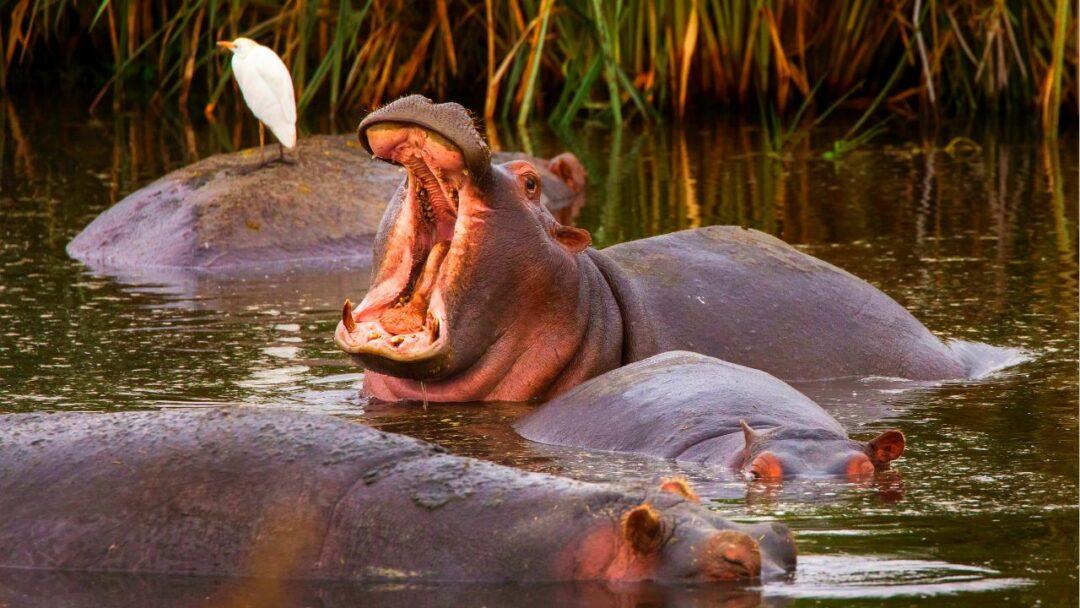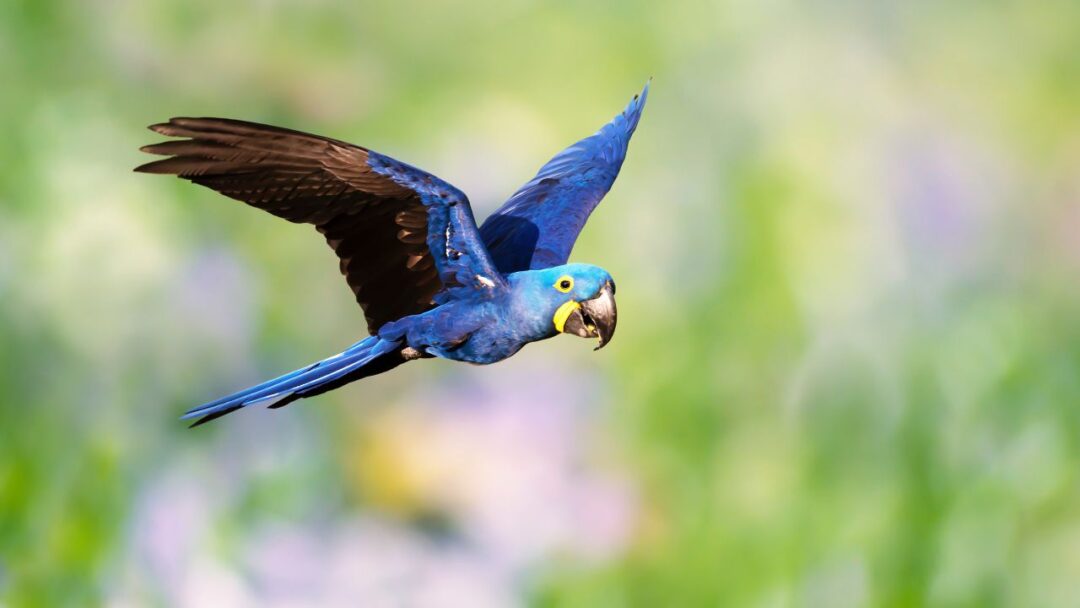Table of Contents

Introduction
Large, semi-aquatic hippos are a common sight in sub-Saharan Africa. The Hippopotamus, also known as the common hippopotamus, Nile hippopotamus, or river hippopotamus, is a large semiaquatic mammal found in Sub-Saharan Africa. It is one of only two surviving species in the Hippopotamidae family, the other being the pygmy hippopotamus. They are renowned for their enormous size, hostile demeanour, and distinctive features. In this post, we’ll look at ten fascinating facts about hippos, such as their various species, unsolved mysteries, urban legends, and ecological significance.
10 Interesting Facts About Hippos
- Hippos are the third-largest land mammal: Adult hippos can weigh between 1,500 to 3,200 kg (3,300 to 7,000 lb) and can reach up to 1.5 meters (5 feet) in height. They are only surpassed in size by elephants and rhinoceroses.
- There are two species of hippos: The common hippopotamus (Hippopotamus amphibius) and the pygmy hippopotamus (Hexaprotodon liberiensis). The common hippo is found throughout sub-Saharan Africa, while the pygmy hippo is only found in West Africa.
- Hippos are herbivores: Hippos are strict herbivores, and their diet consists mainly of grasses. They can consume up to 68 kg (150 lb) of vegetation per day.
- Hippos are excellent swimmers: Hippos are well adapted to aquatic life, and they spend up to 16 hours a day submerged in water. They can hold their breath for up to five minutes and can swim up to 8 km/h (5 mph).
- Hippos have unique skin: The skin of hippos is very thick, up to 6 cm (2.4 in) in some places, and it secretes a red fluid that acts as a natural sunscreen and moisturizer.
- Hippos are social animals: Hippos live in groups called schools or pods, and they communicate with each other through vocalizations and body language.
- Hippos are aggressive: Hippos are known for their aggressive behavior, especially when they feel threatened or when protecting their young. They are responsible for more human fatalities in Africa than any other large animal.
- Hippos are territorial: Hippos mark their territories by spreading dung with their tails and by vocalizing loudly. They are known to defend their territories aggressively against intruders.
- Hippos are nocturnal: Hippos are most active at night, and they spend most of the day resting in the water or on land to avoid the sun.
- Hippos are important to the ecosystem: Hippos play an important role in maintaining the balance of aquatic ecosystems. Their dung provides nutrients for fish and other aquatic animals, and their grazing helps to maintain water quality.
Mysterious Facts and Myths
Hippos have long been associated with myths and mysterious facts. Here are some interesting facts and myths about hippos:
- In some African cultures, hippos are believed to be sacred animals that possess spiritual powers.
- According to some myths, hippos are shape-shifting creatures that can transform into beautiful women.
- Hippos are often portrayed as aggressive and dangerous animals in popular culture, but in reality, they are only aggressive when provoked.
Important to Ecosystem
An essential component of the African ecology are hippos. They are essential to preserving the harmony of aquatic habitats, and their grazing helps to keep the water clean. Hippos’ faeces also serves as a source of nutrition for fish and other aquatic creatures.
What is the size of a hippopotamus?
Hippos are large animals, with males typically measuring around 13 feet (4 meters) in length and standing about 5 feet (1.5 meters) tall at the shoulder. They can weigh up to 3,500 kilograms (7,700 pounds), making them one of the heaviest land mammals.
What do hippos eat?
Hippos are herbivores that eat mostly grass. They are known to consume a large amount of vegetation, grazing for several hours each night. Despite their size, they are picky eaters, preferring tender shoots and leaves.
What is the speed of hippo on land and water?
Despite their bulky size, hippos are surprisingly fast runners, capable of reaching speeds of up to 30 kilometers per hour (18 miles per hour) over short distances. However, they are not built for sustained running and are more agile in water than on land. and they can swim with the speed of 8 km/h. They are very aggressive animals and one of the most dangerous animals on the planet.
Are hippos dangerous?
Yes, hippos are among the most dangerous animals in Africa. Despite their outward appearance, they can be extremely territorial and aggressive, particularly when threatened or protecting their young. It is best to keep a safe distance between you and them.
Can hippos swim?
Absolutely! Hippos are excellent swimmers who spend a lot of time in the water. They have webbed toes that help them move around in the water. Hippos have the ability to hold their breath for several minutes and can even walk or run along the bottom of shallow bodies of water.
Do hippos sleep underwater?
While hippos can sleep in water, they do not do so for long periods of time. Instead, they will frequently rest in the water, partially submerged. They have a reflex that allows them to rise to the surface while sleeping to breathe.
Where do hippos live?
Hippos are native to sub-Saharan Africa and can be found in various countries, including Kenya, Tanzania, Zambia, and Botswana. They inhabit rivers, lakes, and swamps, preferring areas with abundant vegetation and access to water.
Are hippos endangered?
While hippos are not currently classified as endangered, they are still vulnerable due to habitat loss and poaching. To ensure their long-term survival and the preservation of their natural habitats, conservation efforts are required.
How long do hippos live?
In the wild, hippos typically have a lifespan of around 40 to 50 years. However, in captivity, where they are protected and receive proper care, they can live even longer, with some individuals reaching their 60s.
Do hippos have any natural predators?
Because of their size and aggression, adult hippos have few natural predators. Young hippos, on the other hand, are vulnerable to crocodiles and lions. When there is a scarcity of other prey, lions may occasionally attack a young or weak hippo.
Conclusion
Hippos are intriguing creatures with distinctive traits and behaviours. They are some of the biggest land mammals and have great swimming abilities. Hippos are gregarious creatures that can become hostile when disturbed, but they are crucial to preserving the equilibrium of the African ecology.
10 Interesting Facts about Bear : NEXT POST




